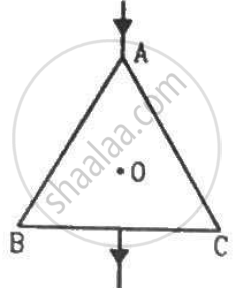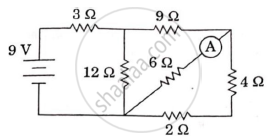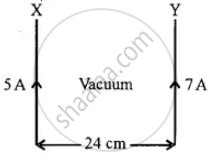Advertisements
Advertisements
Question
An electron is projected with uniform velocity along the axis of a current carrying long solenoid. Which of the following is true?
Options
The electron will be accelerated along the axis.
The electron path will be circular about the axis.
The electron will experience a force at 45° to the axis and hence execute a helical path.
The electron will continue to move with uniform velocity along the axis of the solenoid.
Solution
The electron will continue to move with uniform velocity along the axis of the solenoid.
Explanation:
A solenoid consists of a helical winding of wire on a cylinder, usually circular in cross-section. There can be hundreds or thousands of closely spaced turns, each of which can be regarded as a circular loop. There may be several layers of windings.
Magnetic field due to solenoid B = μ0nl Direction of the field inside the solenoid is parallel to the axis, obtained by right-hand thumb rule as shown in figure.
F = q(v × B)
F = qvB*sinθ
Now, here an electron is moving in magnetic field of solenoid, so the concept of magnetic force comes into existence.
When an electron is projected with uniform velocity along the axis of a current carrying a long solenoid, then the magnetic force due to the magnetic field acting on the electron will be F = – evB sin 180° = 0 (either velocity is parallel to magnetic field or anti-parallel or 0 = 0° or 180° in both cases F = 0). The electron will continue to move with uniform velocity or will go undeflected along the axis of the solenoid.
APPEARS IN
RELATED QUESTIONS
Which of the following particles will have minimum frequency of revolution when projected with the same velocity perpendicular to a magnetic field?
Consider a solid sphere of radius r and mass m that has a charge q distributed uniformly over its volume. The sphere is rotated about its diameter with an angular speed ω. Show that the magnetic moment µ and the angular momentum l of the sphere are related as `mu = q/(2m) l`
Consider a straight piece of length x of a wire carrying a current i. Let P be a point on the perpendicular bisector of the piece, situated at a distance d from its middle point. Show that for d >> x, the magnetic field at P varies as 1/d2 whereas for d << x, it varies as 1/d.
The wire ABC shown in figure forms an equilateral triangle. Find the magnetic field B at the centre O of the triangle assuming the wire to be uniform.

A long wire carrying a current i is bent to form a place along α . Find the magnetic field B at a point on the bisector of this angle situated at a distance x from the vertex.
In the circuit shown in the figure, find the value of the current shown in the ammeter A.

Two infinitely long current carrying conductors X and Y are kept parallel to each other, 24 cm apart in a vacuum. They carry currents of 5A and 7A respectively, in the same direction, as shown in the figure below. Find the position of a neutral point, i.e., a point where resultant magnetic flux density is zero. (Ignore earth’s magnetic field).

Correct expression for force on a current carrying conductor of length dl in a magnetic field is ______.
When a magnetic compass needle is carried nearby to a straight wire carrying current, then
- the straight wire cause a noticeable deflection in the compass needle.
- the alignment of the needle is tangential to an imaginary circle with straight wire as its centre and has a plane perpendicular to the wire.
A charged particle is moving on circular path with velocity v in a uniform magnetic field B, if the velocity of the charged particle is doubled and strength of magnetic field is halved, then radius becomes ______.
